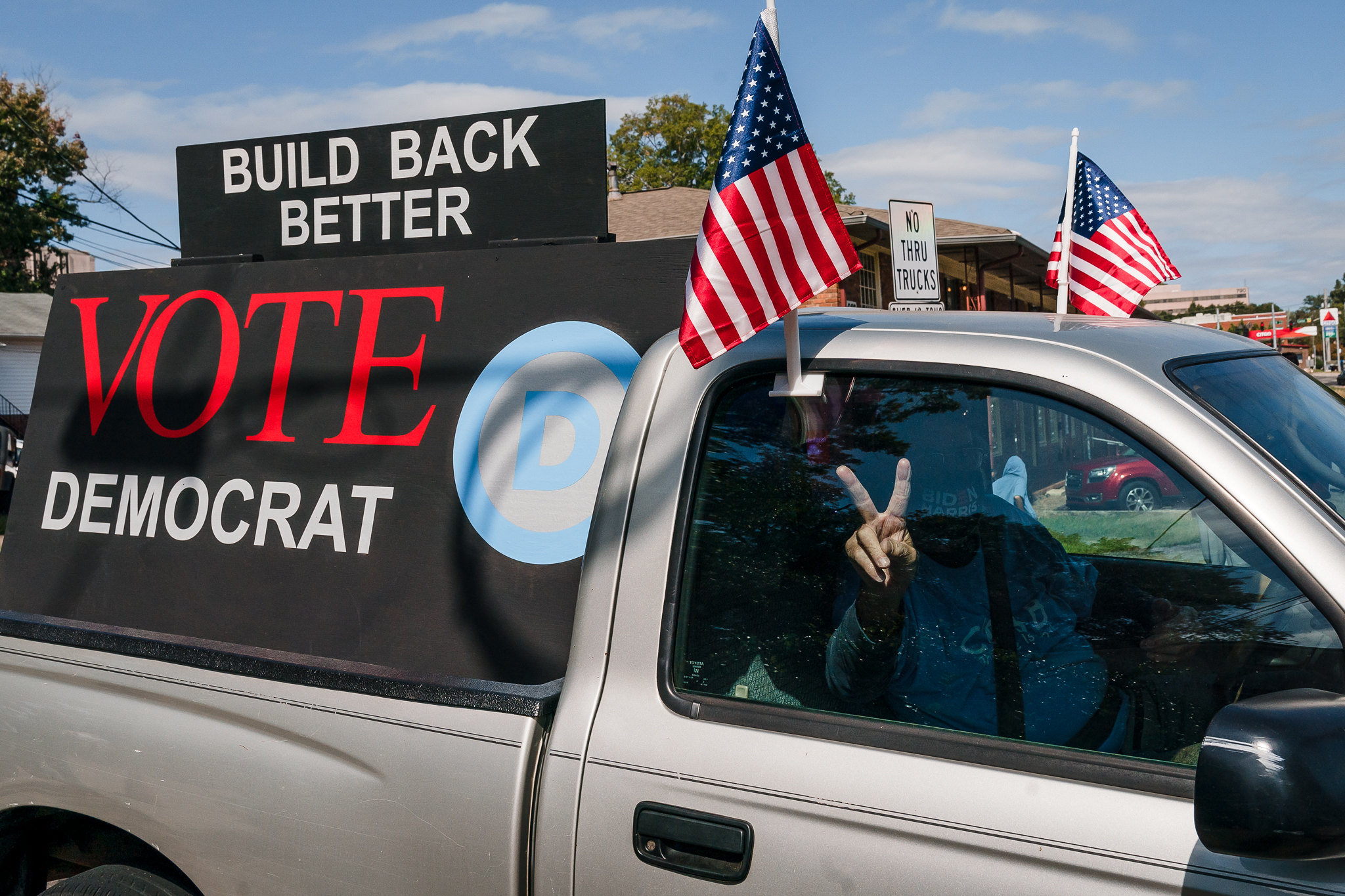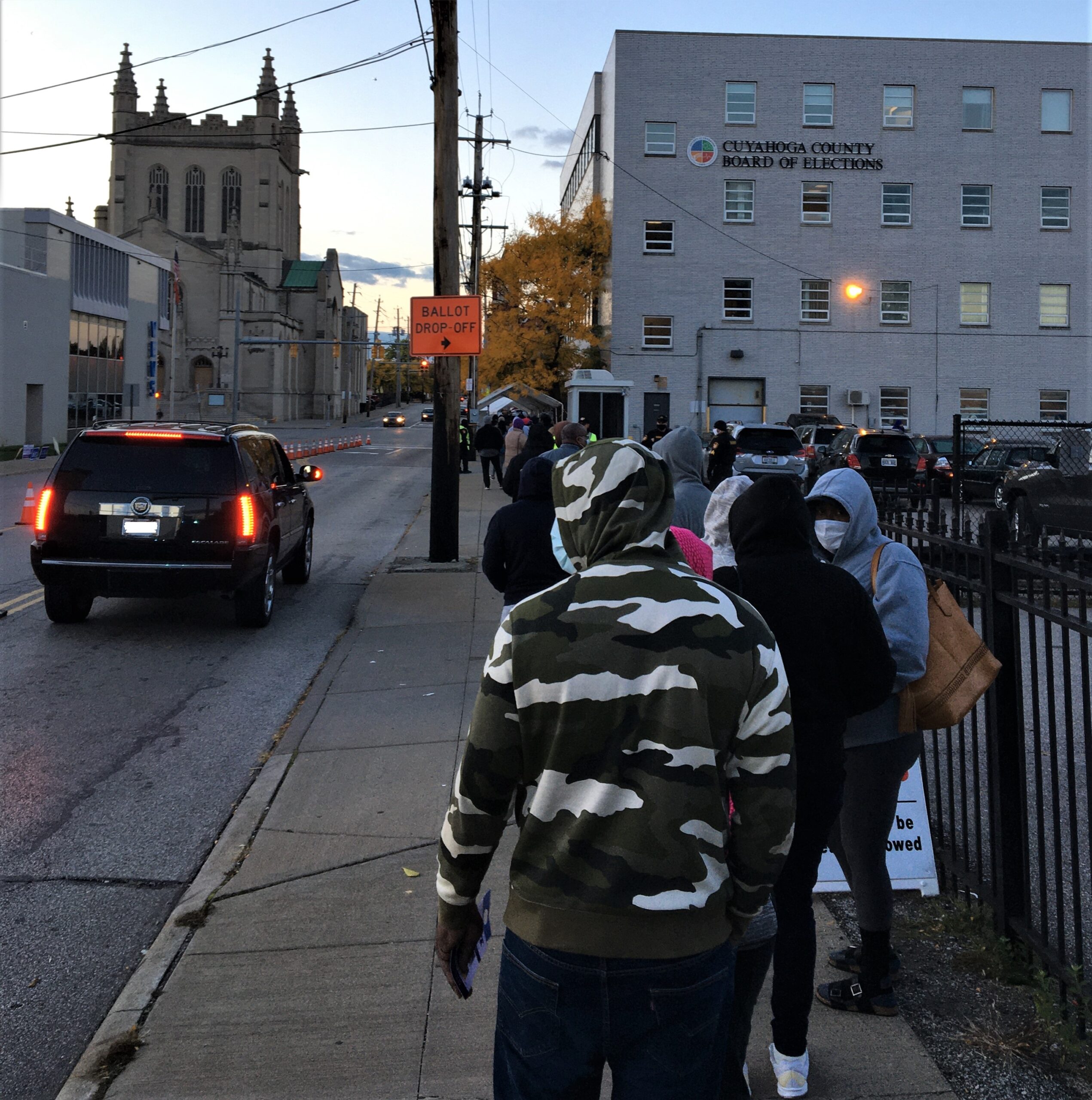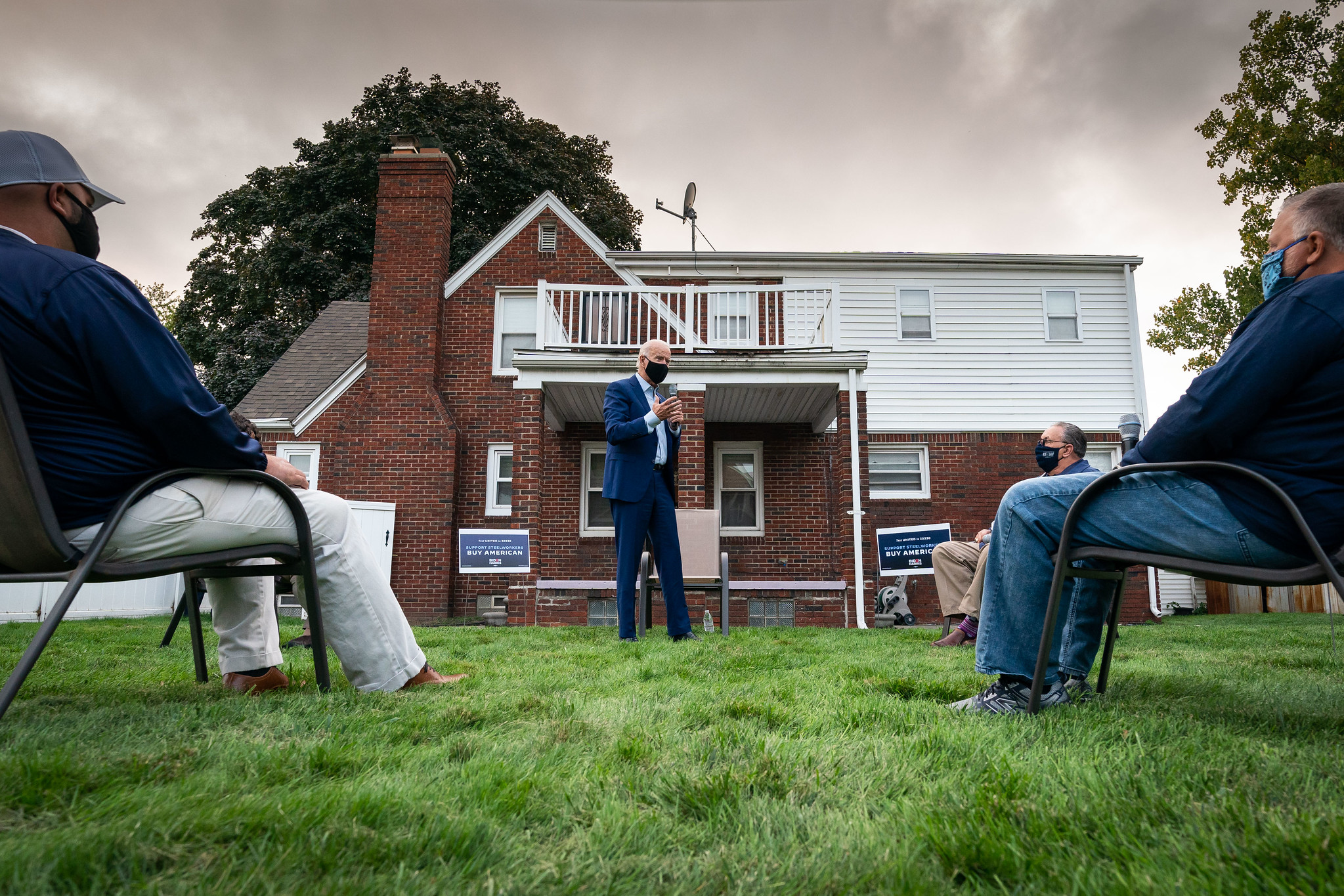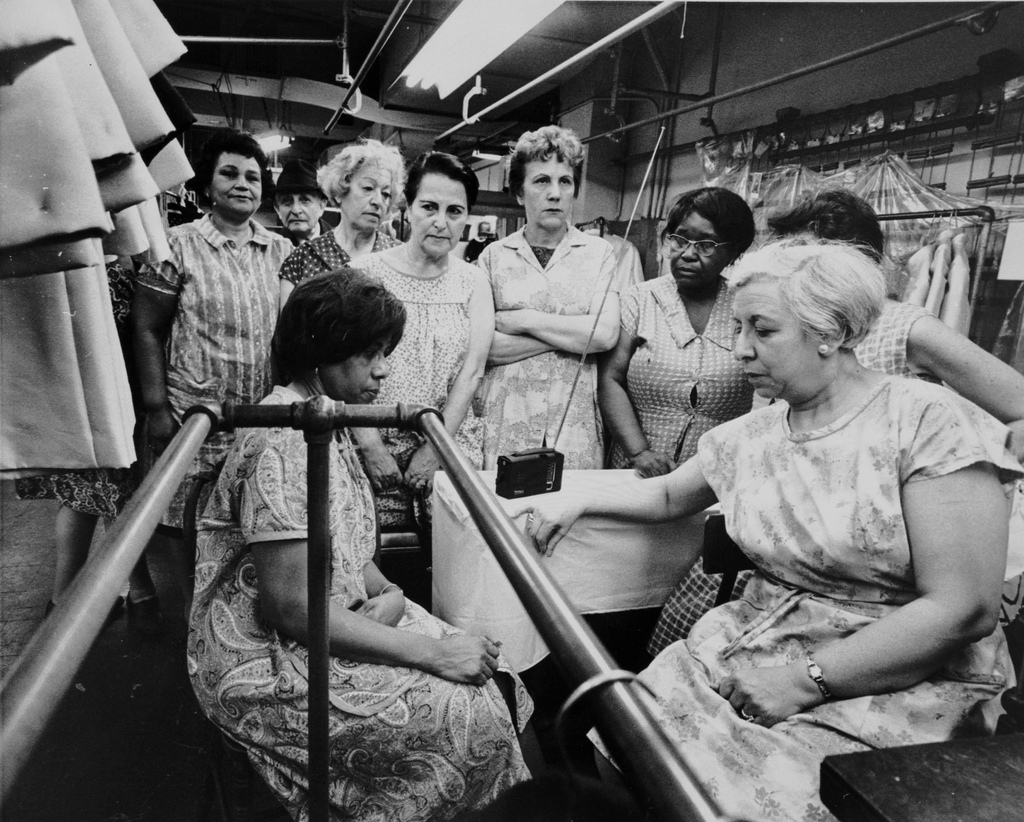
Cobb County Democrats, Marietta, Georgia, Oct. 18, 2020. (Kevin Lowery, Biden for President, Flickr, CC BY-NC-SA 2.0)
 In the two weeks since Election 2020, the country has oscillated between joy and anger, hope and dread in an era of polarization sharpened by the forces of racism, nativism and hate. Still, truth be told, though the divisive tone of this moment may only be sharpening, division in the United States of America is not a new phenomenon.
In the two weeks since Election 2020, the country has oscillated between joy and anger, hope and dread in an era of polarization sharpened by the forces of racism, nativism and hate. Still, truth be told, though the divisive tone of this moment may only be sharpening, division in the United States of America is not a new phenomenon.
Over the past days, I’ve found myself returning to the words of Dr. Martin Luther King, Jr., who, in 1967, just a year before his own assassination, gave a speech prophetically entitled “The Other America” in which he vividly described a reality that feels all too of this moment rather than that one:
“There are literally two Americas. One America is beautiful… and overflowing with the milk of prosperity and the honey of opportunity. This America is the habitat of millions of people who have food and material necessities for their bodies; and culture and education for their minds; and freedom and human dignity for their spirits…
“But tragically and unfortunately, there is another America. This other America has a daily ugliness about it that constantly transforms the ebulliency of hope into the fatigue of despair. In this America millions of work-starved men walk the streets daily in search for jobs that do not exist. In this America millions of people find themselves living in rat-infested, vermin-filled slums. In this America people are poor by the millions. They find themselves perishing on a lonely island of poverty in the midst of a vast ocean of material prosperity.”
In Dr. King’s day, that other America was, for a time, laid bare to the nation through mass social unrest and political change, through the bold actions of the freedom fighters who won the Voting Rights Act and then just kept on fighting, as well as governmental programs like the “War on Poverty.” And yet, despite the significant gains then, for many decades since, inequality in this country has been on the rise to previously unimaginable levels, while poverty remained locked in and largely ignored.
“Two million Americans lack access to indoor plumbing, a 2019 report found, and that has huge implications for their health.”https://t.co/pkwtiFqKdi
— Rev. Dr. William J. Barber II (@RevDrBarber) November 19, 2020
Today, in the early winter of an uncurbed pandemic and the economic crisis that accompanies it, there are 140 million poor or low-income Americans, disproportionately people of color, but reaching into every community in this country: 24 million Blacks, 38 million Latinos, eight million Asians, two million Native peoples, and 66 million whites.
More than a third of the potential electorate, in other words, has been relegated to poverty and precariousness and yet how little of the political discourse in recent elections was directed at those who were poor or one storm, fire, job loss, eviction, or healthcare crisis away from poverty and economic chaos.
In the distorted mirror of public policy, those 140 million people have remained essentially invisible. As in the 1960s and other times in our history, however, the poor are no longer waiting for recognition from Washington. Instead, every indication is that they’re beginning to organize themselves, taking decisive action to alter the scales of political power.
Thousands of cars lined up to collect food in Dallas, Texas, over the weekend, stretching as far as the eye can see. pic.twitter.com/xLFGOcBkPK
— CBS News (@CBSNews) November 16, 2020
For years, I’ve traveled this country, working to build a movement to end poverty. In a nation that has so often boasted about being the wealthiest and freest in history, I’ve regularly witnessed painful divisions caused by hunger, homelessness, sickness, degradation and so much more.
In Lowndes County, Alabama, for instance, I organized with people who lived day-in, day-out with raw sewage in their yards and dangerous mold in their homes. On Apache land in Oak Flats, Arizona, I stood with native leaders struggling to cope with generations of loss and plunder, most recently at the hands of a multinational copper mining company. In Gray’s Harbor, Washington, I visited millennials living in homeless encampments under constant siege by militia groups and the police. And the list, sadly, only goes on.
As the future administration of Joe Biden and Kamala Harris heads for the White House (no matter the recalcitrant loser still ensconced there), the rest of us must equip ourselves with both courage and caution, living as we do in a divided nation, in — to be exact — two very different Americas.
Keep in mind that these are not the insulated, readymade Americas of MSNBC and Fox News, of Republicans and Democrats, of conservatives and liberals. All of us live in a land where there are two Americas, one of unimaginable wealth, the other of miserable poverty; an America of the promised good life and one of almost guaranteed premature death.
Unleashing the Power

Early voting in Cleveland, Ohio, Oct. 16, 2020. (THD3, CC BY-SA 4.0, Wikimedia Commons)
One enduring narrative from the 2016 election is that poor and low-income voters won Donald Trump the White House, even if the numbers don’t bear it out. Hillary Clinton won by 12 points among voters who made less than $30,000 a year and by 9 points among voters who made less than $49,999; the median household income of Trump voters then was $72,000.
Four years later, initial estimates suggest that this trend has only intensified: Joe Biden attracted more poor and low-income voters than President Donald Trump both in the aggregate and in key states like Michigan.
Trump, on the other hand, gained among voters with annual family incomes of more than $100,000. Last week, the director of the MIT Election Data and Science Lab noted that this “appears to be the biggest demographic shift I’m seeing. And you can tie that to [Trump’s] tax cuts [for the wealthy] and lower regulations.”
In 2016, there were 64 million eligible poor and low-income voters, 32 million of whom did not vote. In 2020, it’s becoming clear that poor and low-income voters helped decide the election’s outcome by opting for a candidate who signaled support for key antipoverty issues like raising the minimum wage, expanding health care, and protecting the environment.
In down-ballot races, every congressional member who endorsed Medicare for All won reelection, even in swing states. Imagine then how many dispossessed and disenfranchised voters might have turned out if more candidates had actually been speaking to the most pressing issues of their lives?
Seventy-two percent of Americans said that they would prefer a government-run healthcare plan and more than 70 percent supported raising the minimum wage, including 62 percent of Republicans. Even in districts that went for Trump, voters passed ballot measures that, only a few years ago, would have been unheard of.
In Mississippi, people voted to decriminalize medical marijuana, while in Florida a referendum for a $15 minimum wage got more votes than either of the two presidential candidates.

Joe Biden in campaign event with United Steelworkers Employees, Sept. 9, 2020. (Adam Schultz, Biden for President, Flickr, CC BY-NC-SA 2.0)
If nothing else, election 2020 revealed a deeply divided nation — two Americas, not one — though that dividing line marked anything but an even or obvious split. A startling number of Americans are trapped in wretched conditions and hungry for a clean break with the status quo.
On the other hand, the rampant voter suppression and racialized gerrymandering of the last decade of American politics suggests that extremists from the wealthier America will go to remarkable lengths to undercut the power of those at the bottom of this society.
They have proven ready to use every tool and scare tactic of racist division and subterfuge imaginable to stop poor Black, Latino, Asian, Indigenous, and white potential voters from building new and transformative alliances, including a new electorate.
It’s time to move beyond the defeatist myth of the Solid South or even the dulling comfort of a Midwestern “blue wall.”
Across the South and the Midwest, there are voter-suppression states still to win, not for a party, but for a fusion movement of the many. The same could be true for the coasts and the Southwest, where there remains a sleeping giant of poor and low-income people yet to be pulled into political action.
If this country is ever going to be built back better, to borrow Joe Biden’s campaign pledge, it’s time to turn to its abandoned corners; to, that is, the other America of Martin Luther King that still haunts us, whether we know it or not.
Fusion Politics

Garment workers listen to Rev. Martin Luther King Jr.’s funeral service on a portable radio, April 9, 1968. (Kheel Center, Cornell University, CC BY 2.0, Wikimedia Commons)
When Dr. King gave his “Other America” speech, he was preparing for what would become the last political project of his life: the Poor People’s Campaign. At a time when the nation appeared to be fraying at the seams, he grasped that a giant social leap forward was still possible.
In fact, he envisioned a protracted struggle that might catapult this country into a new era of human rights and revolution not through sanguine calls for unity, but via a rousing fusion of poor and dispossessed people from all walks of life. And that, as he imagined it, would also involve a recognition that systemic racism and other forms of hate and prejudice were crucial to the maintenance of the two Americas and had to be challenged head-on.
The idea of such fusion politics echoed earlier chapters of political reckoning and transformation in this country. From the post-Civil War era of Reconstruction into the 1890s, newly emancipated Blacks built unprecedented, if fragile, alliances with poor whites to seize governing power.
Across a new South, fusion parties expanded voting rights, access to public education, labor protections, fair taxation and more. In North Carolina in 1868, for instance, legislators went so far as to rewrite the state constitution to codify for the first time the right of all citizens to “life, liberty, and the enjoyment of the fruits of their own labor.”
For nearly 30 years, I’ve been part of a modern version of fusion organizing, even as I studied earlier examples of it — and this country’s history is rich with them. Indeed, the modern Poor People’s Campaign that I co-chair is itself inspired by such past fusion movements, including the version of politics I was first introduced to by multiracial welfare rights and homeless organizing in the 1980s and 1990s.
Organizations like the National Welfare Rights Union and the National Union of the Homeless first grew in response to the neoliberal politics of President Ronald Reagan and his attacks on the poor, especially the Black poor, or, as he put it, “welfare queens.” In response to such myths and deep, divisive cuts, out of shelters and from the streets, poor people began to organize projects of mutual aid and solidarity, including “unions” of the homeless.
By the 1980s, the National Union of the Homeless had been created and had upwards of 30,000 members in 25 cities. Meanwhile, organizers across the country soon escalated their efforts with waves of coordinated and nonviolent takeovers of vacant federally owned buildings at a time when the government had abdicated its responsibility to protect and provide for its poorest citizens.
Those poor and homeless leaders also helped the Homeless Union secure guarantees from the federal government both for more subsidized housing and for protections of the right of the homeless to vote.
Today, in the middle of an economic crisis that could, in the end, rival the Great Depression, I’m reminded not just of those moments that first involved me but of the fusion movements of the early 1930s. After all, in those years, shanty towns called “Hoovervilles” — given that Herbert Hoover was still president — cropped up in cities across the country.
Not unlike the tent cities of the Homeless Union and the Welfare Rights Movement in the 1980s and the ones appearing today, those Hoovervilles were where masses of the unemployed and homeless gathered to survive the worst of that depression and strategize on how to resist its misery. Multiracial Unemployed Councils organized and fought for relief for workers without jobs then, preventing thousands of evictions and utility shutoffs.
Meanwhile, in the abandoned fields of the Southern Delta from Arkansas to Mississippi, groups like the Southern Tenant Farmers Union pioneered the dangerous work of organizing Black and white tenant farmers and sharecroppers.
When the New Deal coalition bet its future on compromise with white Southern extremists, members of that union were among the last guardians of the rights of poor agrarian workers. Their lonely clarity on the significance of fusion politics in the South stood in stark contrast to the rise of an unmitigated politics of white reaction there.
Today, as top Democrats like Joe Biden and Senate Minority Leader Chuck Schumer claim the legacy of Great Depression-era President Franklin Delano Roosevelt, remember the fusion organizing that helped bring him to power and pushed him to enact change.
I’m thinking in particular of the more than 40,000 unemployed veterans of World War I who arrived in Washington D.C. in 1932 to demand the early payment of promised bonuses, previously only considered redeemable after 1945.
That Bonus Army, as the veterans called it, collected many of the fraying threads of the American tapestry, making camp, sometimes with wives and children, on seized public land just across the Potomac River from the capital’s federal office buildings, while holding regular nonviolent marches and rallies.
Eventually, Hoover ordered the U.S. Army to tear down the camp in a violent fashion. The mistreatment of those poor and war-weary veterans in the process proved to be a lightning rod for the public and so Hoover lost to FDR in the presidential election later that year, setting the stage for a decade defined by militant organizing and major shifts in national policy.
The Mandate of the Poor Today

Martin Luther King Jr. meeting with President Lyndon Johnson at the White House in 1966. ( Yoichi Okamoto, LBJ Library and Museum, Wikimedia Commons)
There are already those in the media and politics who are counseling restraint and a return to the pre-Trump days, as if he were the cause, not the consequence, of a nation desperately divided. This would be nothing less than a disaster, given that the fissures in our democracy so desperately need mending not with nice words but with a new governing contract with the American people.
The battleground states that won Joe Biden the presidency have also been battlegrounds in the most recent war against the poor. In Michigan, hit first and worst by deindustrialization, millions have struggled with a failing water system and a jobs crisis.
In Wisconsin, where unions have been under attack for years and austerity has become the norm, both budgets and social welfare policies have been slashed by legislatures. In Pennsylvania, rural hospitals have been closing at an alarming rate and, even before the pandemic hit, the poorest large city in the country, Philadelphia, had already become a checkerboard of disinvestment and gentrification.
In Georgia, 1.3 million renters — 45 percent of the households in that state — were at risk of eviction this year. And in Arizona, the climate crisis and Covid-19 have ravaged entire communities, including the members of Indigenous nations who recently turned out to vote in record numbers.
The people of these states and 15 more helped elect Joe Biden and Kamala Harris, and count on one thing: with their votes, they were calling for more than just an end to Trumpism. They were demanding that a new era of change begin for the poor and marginalized.
The first priority in such an era should, of course, be to pass a comprehensive relief bill to control the pandemic and buoy the millions of Americans now facing a cold, dark winter of deprivation. The House and the Senate have a moral responsibility to get this done as soon as the new administration takes office, if not before (though tell that to Mitch McConnell).
The first 100 days of the Biden administration should then be focused, at least in part, on launching a historic investment in securing permanent protections for the poor, including expanded voting rights, universal healthcare, affordable housing, a living wage, and a guaranteed adequate annual income, not to speak of divestment from the war economy and a swift transition to a green economy.
That should be the mandate of our next government. And that’s why we, the overflowing millions, must harness the fusion politics that was so crucial to the election of Joe Biden and Kamala Harris and organize in the best tradition of our predecessors.
Real social progress rarely comes slowly and steadily, but in leaps and bounds. The predictable stalemate of the next administration and its Republican opposition can’t be broken by grand speeches in the House or Senate. It can only be broken by a vast social movement capable of awakening the moral imagination of the nation.
It’s time to get to work.
Liz Theoharis, a TomDispatch regular, is a theologian, ordained minister, and anti-poverty activist. Director of the Kairos Center for Religions, Rights and Social Justice at Union Theological Seminary in New York City and co-chair of the Poor People’s Campaign: A National Call for Moral Revival, she is the author of Always With Us? What Jesus Really Said About the Poor.
This article is from TomDispatch.com.
The views expressed are solely those of the author and may or may not reflect those of Consortium News.
Please Contribute to Consortium News
Donate securely with
Click on ‘Return to PayPal’ here.
Or securely by credit card or check by clicking the red button:



I definitely, 100% agree with Ms. Theoharis’ ‘should’ statement in the 2nd to-last paragraph, and all of the other ills she lists with this country. The solutions she lists are humanistic, positive ones that are the best feasible ones available.
The extremely frustrating part is HOW do we get there?? It’s an easy answer to glibly say (as Chomsky and others always extoll) ‘we need to organize’, but getting a majority of the electorate to support these solutions no longer seems plausible, tragically. For instance, progressives can’t even get widespread support for eminently-sane gun control measures in this country, even with mass-shootings an almost weekly occurrence (much-less the ‘background’ shootings of the non-mass variety). On a global scale, there were large anti-Iraq-invasion marches many of us took part in back in 2003, but to no-avail — the US ‘deep-state’ prevailed and got their Iraq War-crime as well as subsequent military interventions in Libya, Syria, etc. And even AFTER it was revealed by the MSM (in uncharacteristically truthful coverage) that the Iraq invasion was concocted with bogus reasons (NO WMDs, NO aluminum centrifuge tubes, NO uranium yellow-cake, ‘Curveball’ revealed to have-been a non-credible source since day-one, etc, etc) — the ‘W’ administration was REWARDED with RE-ELECTION*, just as Richard Nixon was re-elected in 1972!!?
I’ll continue to believe in the efficacy of progressive, humanistic solutions to political problems, but it’s really starting to feel like what the Weimar Republic was probably like, with right-wing factions controlling the agenda and eventually the government, albeit with obviously different policy-problems. One can only hope that it doesn’t take a world-war to dislodge that conservative/right faction, but it’s hard to be optimistic. There’s too much deep-rooted US exceptionalism for it to be easily overcome by rational arguments.
* (So guess what kind of message that sent to US politicians, who were already cowed by electorate fear/anger over 9/11?).
The battle continues…
I’ll have more respect for Ms. Theoharris when I see her challenge James Clyburn and the the Congressional Black Caucus that gave us Joe Biden as our president rather than Bernie Sanders. The Congressional Black Caucus is as corrupt and as much a tool of the 1% as the corrupt Democratic Establishment, in fact, they’re an essential component of it. Ms. Theoharris, when you start taking on these power structures that inflict so much misery on the least among us, I’ll not only listen to you, I’ll resume my contributions to the Poor People’s Campaign.
In today’s toxic America, you’re part of the problem, not part of the solution.
Good article. It is, however, flawed in holding out hope that Biden can be prodded into becoming another FDR.
I am seeing this delusional notion quite a bit now that it appears Biden will replace Trump. The next stage will be buyer’s remorse for Biden is a hard-core neoliberal.
As such he opposes everything the author hopes to accomplish.
It’s simply too late. There is not, and will not be, a “people’s movement.” We spent the last quarter-century detailing the growing split among the masses, mainly by class, that would come back to haunt us. Our last chance to repair these divisions came and went with the Obama administration. We warned throughout that the rich would step up to do to the middle class, what the middle class did to the poor. And here we are.
Talk about at a snail’s pace and frankly, the snail is losing ground. This was a wearying read. I admire your optimism in the face of so much evidence to the contrary. Small wins I’m grateful for but long term, our problems of poverty, imperialism, war, inequality are worsening. I don’t know the answer but thanks to people like you, the despair in small pockets is being mitigated.
The oligarchs who own the system will not allow any relief for the poor and working class until they fear the disenfranchised. We have to shut their profit system down until they relent. The sooner we figure this out, the better chance humans have of surviving beyond this century.
Liz, this is an excellent article.
I live near Oak Flats and know many who object, including me,
to the corporations that continue to destroy the planet earth.
I appreciate your efforts to help the ever growing population of folks doing without basic necessities.
Please keep in mind the planet has 7.5 billion humans and continues to expand while decimating other species.
Maybe Thomas Malthus was onto something even though a number of “smart” folks say he was wrong.
I kinda favor what Jared Diamond said about, Hunter Gatherers and the Advent of Agriculture.
Keep scribbling and thanks again for your Samaritan efforts